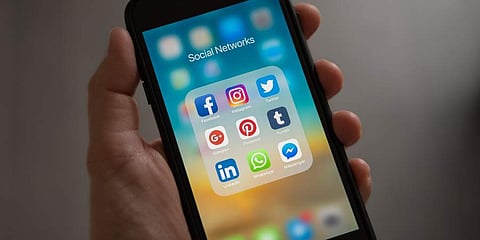

The reluctance of social media intermediaries to abide by the new government regulations is inexplicable in the first place. Looking at the recent developments and the recalcitrant approach of social media platforms, allowing this slugfest to continue would prove to be detrimental to their credibility. One can only hope that these platforms would not eat into their own vitals like Bhasmasura, the mythological character known for unwittingly causing self-destruction.
To start with, what exactly compelled the government to propose some regulations and give a window of three months to the platforms to abide by them? The fact remains that social media saw phenomenal increase in the number of users, especially in the last five years. There were 448 million social media users in India in January 2021.These figures have seen an increase by 78 million (21%) within just one year, between 2020 and 2021. According to some unofficial estimates, about 32% Indians today are using social media.
Despite their growing popularity, the conduct on and by most social media platforms had become a cause of concern practically for all. In January 2019, Natasha Tusikov, a criminology expert and academic, wrote in a co-authored article that Facebook “stands accused by a United Nations agency of contributing to a genocide in Myanmar by failing to effectively police hate speech on its platform. Others have noted how radio played a similar role in the 1994 Rwandan genocide. Facebook is only the most obviously awful of the social media platforms that have become so central to our social, economic and political lives. All of the major (for-profit, American) social media platforms have been tainted by scandals, from Instagram’s link to Russia’s 2016 US Presidential Operation to YouTube’s algorithmic propensity to serve up neo-Nazi propaganda, and Twitter’s ongoing failure to police white supremacists on its platform”. Whether or not these allegations stand scrutiny, the platforms need to come clean for sure. Obviously, then, an urgent need to regulate the way they function was felt in India too. Hence the government issued a set of guidelines/regulations in February last, giving a clear three-month window to implement them. Social media intermediaries may have some issues with these guidelines and regulations, but how can disregarding or rejecting them be in anybody’s interest?
It is a fact that many political parties exploited social media platforms to the hilt during election campaigns. It was the failure of the mainstream media, both print and electronic, that created a space for social media. Democratisation of the public opinion space was the most attractive feature of the social media intermediaries. It gave commoners their own forum where they were able to express their views, share ideas, criticise others and engage in a debate at their own will. Except for adhering to the word limit on platforms like Twitter, people could roam freely on these anytime and from anywhere. No wonder, since its inception in the 90s, social media has managed to enter the lives of more than half of the 7.7 billion people in the world. From 970 million in 2010, the number of users has touched more than 3.87 billion today.
However, having lured crores of people all over the world, at least some of the social media platforms have started showing their real colours. There are at least three issues involved in the ongoing debate that merit response from the platforms. It starts with their opacity. The decision-making process of these public media organisations has neither any room for stakeholder participation nor any structured and well-defined grievance redressal mechanism. Nobody knows as to how their algorithms operate. The Twitterati have some lingering doubts about sudden changes in their number of followers, retweets, etc. All this smacks of complete disregard for the principle of transparency and public accountability on the part of platforms. Even in the face of the latest row over labelling tweets as ‘manipulated media’, there is absolutely no clarity as to how Twitter has come to this conclusion. And how can any platform sit in judgement as per its whims and fancies? Besides, it is also noteworthy that no social media intermediary has come forward arguing about the robustness of the technology or algorithms used, disallowing any suspected mischief or manipulation. All this naturally calls for a transparent oversight mechanism for social media in the larger interest of democracy.
The second contentious point is, why did some of the platforms choose to disregard the new regulations for such a long time? Is it their contempt towards the law of the land? If they are okay with similar regulations in other countries, why are they seemingly refusing to abide by the ones framed by a democratically elected government?
The third and the most important issue is whether the social media intermediaries are just platforms or if they are into publishing like a journal, as they are using a kind of editorial prerogative in deciding the content to be published. In that case, should the platforms not come under the purview of acts that govern other established media publishing houses? As recently as the end of last year, Ms Meenakshi Lekhi, Chairperson of the Joint Committee of Parliament on the Personal Data Protection Bill, had observed that the intermediaries “themselves are the platforms, sellers and news agencies. And Google itself has the control button to which information will come first and which will come later … So how can it be a neutral platform?”
Social media intermediaries must understand that open access, truly democratic nature and non-partisan character made them stand apart. Understandably, their refusal to protect these unique features creates strong suspicion about their intent. All in all, they must appreciate that like any agency—government or otherwise—they too can’t have their own liberty protected while denying transparency and accountability to their stakeholders.
Vinay Sahasrabuddhe
President, ICCR, and BJP Rajya Sabha MP
(vinays57@gmail.com)